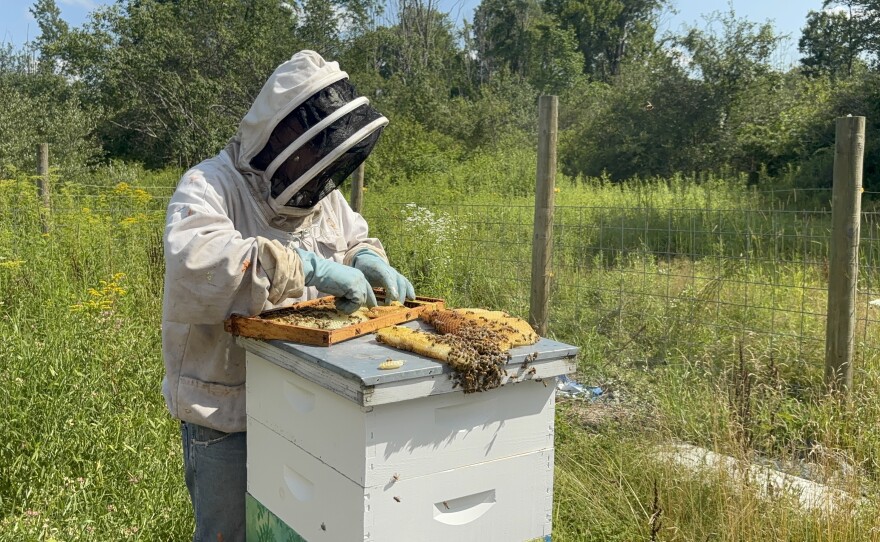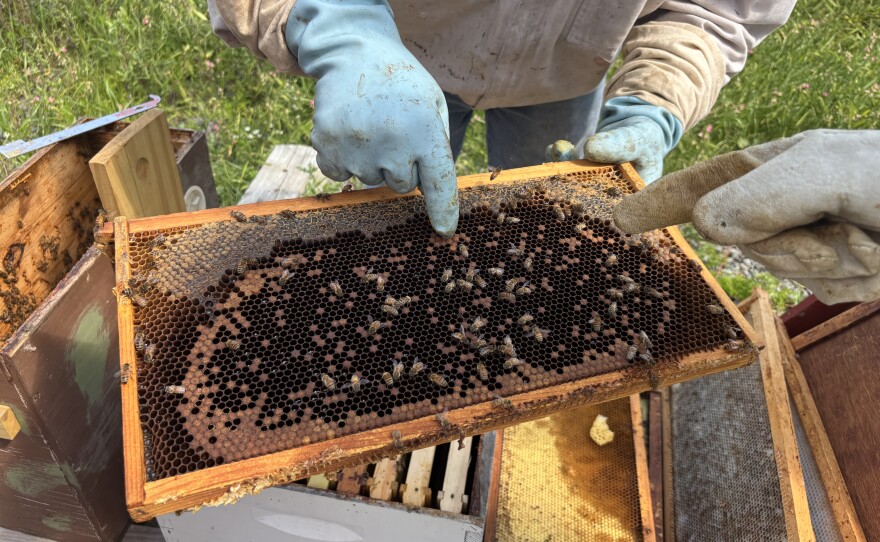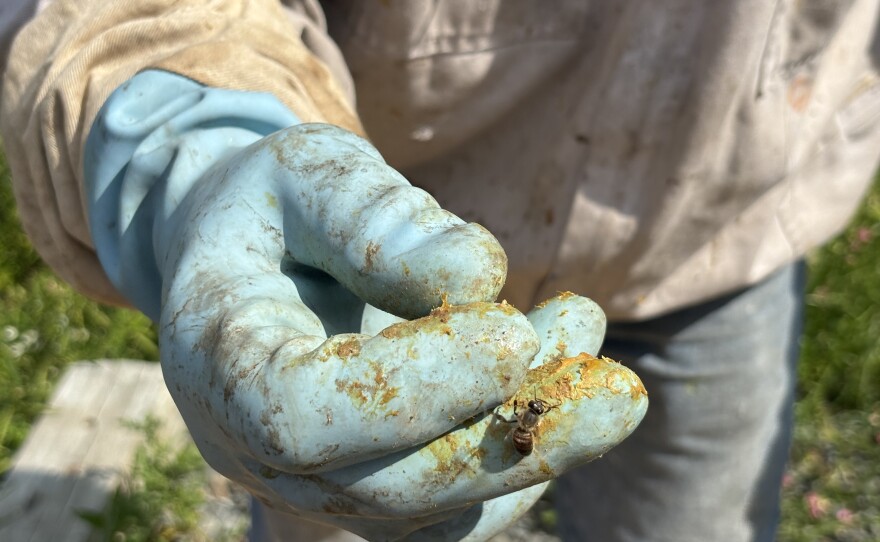When someone stole as many as 15,000 bees from Keystone College last week, private beekeeper Sonny Kierzkowski was ready to help.
Kierzkowski donated six frames of bees, or about 5,000 to 10,000 bees.
Kierzkowski, a member of the Lackawanna Backyard Beekeepers, said he long wanted to get involved with the college’s apiary and saw the donation as a chance to help up and coming beekeepers.
“[It’s] good for the students, good for the bee population, good for everyone,” Kierzkowski said as he stood inside Keystone’s apiary.
An apiary is a place specially designed for holding bees.
Campus safety staff are investigating the July 15 theft, Keystone director of campus safety Michael Golay said. They're reviewing surveillance footage to identify suspects and will install additional safety gates.
Anyone with information on the bee theft can call 570-945-8266.
The Clarks Summit beekeeper and a friend catch swarms of unwanted bees (often from someone’s house or business) in Lackawanna and Wyoming counties. He then relocates the bees either to one of his own hives or other beekeepers’ hives.
Kierzkowski and Keystone staff moved the bees into the college’s apiary on Wednesday. Kelley Stewart, director of the Keystone Environmental Education Institute and Shanon Hornung, an institute beekeeper, helped settle thousands of bees in their new home.
Kierzkowski’s own path to beekeeping wasn’t straightforward. For years, he couldn't start his own apiary.
“I was allergic to bees, so I couldn't do it [as a kid in] Boy Scouts. They wouldn't let me,” Kierzkowski said.
A possible visit to the emergency room did not deter him. He found beehives that better protect him from possible stings, wore protective clothing and learned to use smoke to keep bees calm.
Smoke disrupts a colony’s pheromones, their biochemical communication line. Beekeepers use smoke to enter a beehive, gather honey or check for mites and other health concerns without getting stung, Stewart said.
For Kierzkowski, every precaution, including carrying an epi pen, is worth it. He talked about how bees pollinate almost all of our food system.
“It's a different hobby. It's something that's challenging to do. It's fun to do. I mean, it's helping the environment,” Kierzkowski said.
Bees pollinate more than 80% of the world’s flowering plants, according to the U.S. Department of Agriculture. One of three bites of food, including fruits, vegetables, chocolate and coffee is made with the help of pollinators.
Thousands of bees find a new home at Keystone
Before moving bees into their new Keystone hive, Kierzkowski covered a small, empty rectangular frame in multicolored rubber bands. He stretched the bands down the frame diagonally and across to form a web for excess honeycomb.
Hornung waved smoke around the bees with what looked like a toy watering can.
Kierzkowski and Hornung then pulled frames from a box and placed them vertically in one of the hives. While the two worked, Kierzkowski broke off excess honeycomb while bees swarmed around it and his hands. He stacked the excess on top of a nearby hive.
After placing the filled frames into the hive, Kierzkowski layered the excess honeycomb in the frame covered in rubber bands. Like an artist, he moved pieces around like a jigsaw puzzle until he found a fit he was pleased with.
Stewart: the thief was a beekeeper
Stewart said the thief must be someone experienced with bees who knows the Trolley Trail.
“You [would] have to do this at night. During the day, there are forager bees that will leave the hive, and they only return upon dusk time. So, you have to wait till after sundown to go and move the bees,” Stewart said.
The apiary is not easy to spot – it’s off of the Trolley Trail that runs through the college in LaPlume Township and into Factoryville Borough. Stewart said she believes the thief hiked the 1.7 mile-long trail or drove up to the Whitney Chamberlin Memorial Trailhead in the dark to reach the apiary.
That Wednesday morning, Stewart said Hornung found the hive awfully quiet – and the college’s nuc box missing.
Nuc boxes are used to catch swarms. They’re usually filled with lemongrass or something similar to attract bees. Stewart said the college caught a swarm about four weeks ago and was waiting for new bees to join its hives.
Someone turned off the apiary’s electric fence, removed the chain from the gate. The thief systematically took frames filled with bees out of one hive box and moved them into the nearby nuc box before leaving with it, Stewart said.
She said she didn’t want to believe someone stole the bees out of malicious intent. She wondered if someone took the bees out of a genuine but misguided interest.
“I had hoped that maybe they thought they were doing something nice, maybe [they thought the hive was] abandoned," Stewart said. "Maybe they were still…thinking that the school wasn't going to continue or something. But, I really don't know what goes through someone's mind."
She posted about the theft on Facebook in the hope the thief would come forward. She was surprised to see the outpouring of support for the college and its beekeeping program.
“It's really sweet that people are upset about it, and just care about our bees,” Stewart said.
The thief stole about $500 to $600 in bees and materials. High quality nuc boxes can cost about $250 and a package of bees can cost about $120, said Stewart.
Keystone buzzes with excitement for its future
Stewart said the college plans to offer beekeeping classes again for the spring semester. She said the college suspended its beekeeping program, which started in 2004, while the school’s future was uncertain.
On June 30, Keystone merged with a Washington, D.C.-based nonprofit to form Keystone College LLC, which is solely owned by the Washington Institute for Education and Research (WIER).
With a steadier path forward, Stewart said the institute has the financial support necessary to start hosting beekeeping classes in January and hold programming this fall. She hopes to expand the program further for undergraduate and graduate studies.
* Keystone public safety director Michael Golay is the husband of Faith Golay, WVIA News' managing editor.









